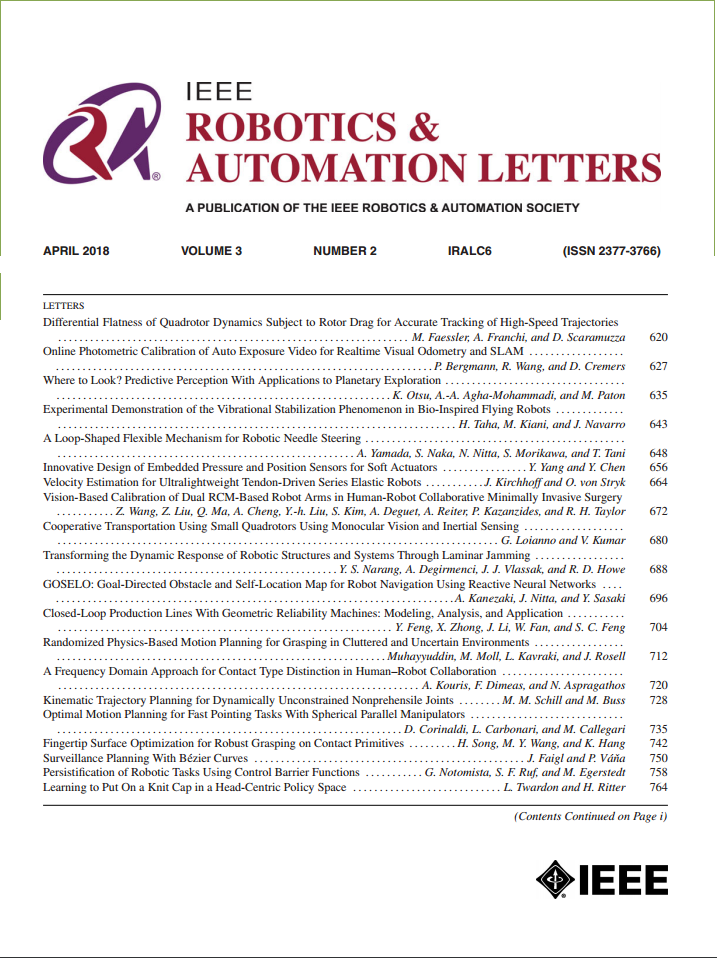Self-Supervised Diffusion-Based Scene Flow Estimation and Motion Segmentation With 4D Radar
IF 4.6
2区 计算机科学
Q2 ROBOTICS
引用次数: 0
Abstract
Scene flow estimation (SFE) and motion segmentation (MOS) using 4D radar are emerging yet challenging tasks in robotics and autonomous driving applications. Existing LiDAR- or RGB-D-based point cloud processing methods often deliver suboptimal performance on radar data due to radar signals' highly sparse, noisy, and artifact-prone nature. Furthermore, for radar-based SFE and MOS, the lack of annotated datasets further aggravates these challenges. To address these issues, we propose a novel self-supervised framework that exploits denoising diffusion models to effectively handle radar noise inputs and predict point-wise scene flow and motion status simultaneously. To extract key features from the raw input, we design a transformer-based feature encoder tailored to address the sparsity of 4D radar data. Additionally, we generate self-supervised segmentation signals by exploiting the discrepancy between robust rigid ego-motion estimates and scene flow predictions, thereby eliminating the need for manual annotations. Experimental evaluations on the View-of-Delft (VoD) dataset and TJ4DRadSet demonstrate that our method achieves state-of-the-art performance for both radar-based SFE and MOS.基于自监督扩散的四维雷达场景流估计和运动分割
使用4D雷达的场景流估计(SFE)和运动分割(MOS)是机器人和自动驾驶应用中新兴但具有挑战性的任务。现有的基于激光雷达或rgb - d的点云处理方法,由于雷达信号高度稀疏、有噪声和容易产生伪影的特性,往往在处理雷达数据时表现不佳。此外,对于基于雷达的SFE和MOS,缺乏注释数据集进一步加剧了这些挑战。为了解决这些问题,我们提出了一种新的自监督框架,该框架利用去噪扩散模型有效地处理雷达噪声输入,并同时预测点方向的场景流和运动状态。为了从原始输入中提取关键特征,我们设计了一个基于变压器的特征编码器,以解决4D雷达数据的稀疏性。此外,我们通过利用鲁棒刚性自我运动估计和场景流预测之间的差异来生成自监督分割信号,从而消除了手动注释的需要。在delft视图(VoD)数据集和TJ4DRadSet上的实验评估表明,我们的方法在基于雷达的SFE和MOS方面都达到了最先进的性能。
本文章由计算机程序翻译,如有差异,请以英文原文为准。
求助全文
约1分钟内获得全文
求助全文
来源期刊

IEEE Robotics and Automation Letters
Computer Science-Computer Science Applications
CiteScore
9.60
自引率
15.40%
发文量
1428
期刊介绍:
The scope of this journal is to publish peer-reviewed articles that provide a timely and concise account of innovative research ideas and application results, reporting significant theoretical findings and application case studies in areas of robotics and automation.
 求助内容:
求助内容: 应助结果提醒方式:
应助结果提醒方式:


